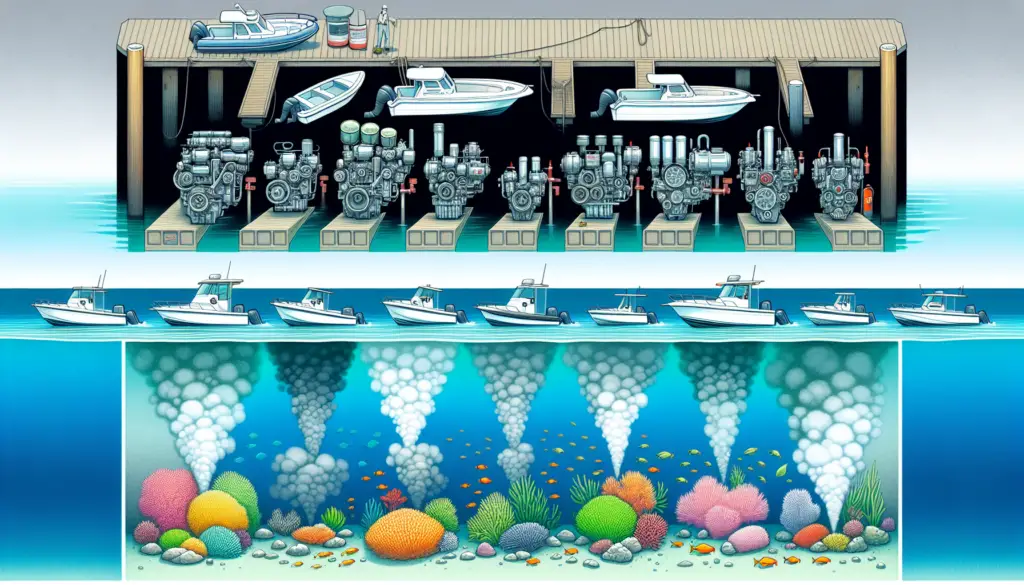Just imagine yourself elegantly cruising on the water in your sleek boat, the warmth of the sun on your skin, and the gentle breeze in your hair. What you may not realize, as you relish in this moment of bliss, is that the engine purring beneath you could be causing significant environmental damage. The article titled “The Environmental Impact Of Different Boat Engine Types” intricificately breaks down the varying degrees of environmental repercussions caused by different types of boat engines. It’s an eye-opening read that highlights the urgent need for eco-friendlier maritime practices. With every type of engine comprehensively analyzed, from petrol-powered motors to electric engines, you’ll gain a deeper understanding of your role in preserving our water bodies for future generations.
Overview of Boat Engines
When you think of boats, what comes to mind? Most people envision seasonal cruising, fishing trips, relaxing afternoons at sea, but it’s the boat engine that plays a silent yet integral role in these water activities. The heart of these vessels, boat engines, are what enables them to move through the waters, turning energy into motion.
Types of Boat Engines
You may wonder, how many kinds of boat engines exist? Here’s a brief summary. Broadly speaking, there are five main types including diesel, petrol, electric, hybrid, and solar-powered engines. The choice among these is determined by numerous factors.
Factors that Determine the Choice of Boat Engines
When you purchase a boat, you must consider the boat’s intended use, your budget, the boat’s size, and, very importantly, the engine type. The type of engine you select influences the servicing and running cost, the boat’s performance, and even the environmental implications.
General Mechanics of Boat Engines
The primary function of a boat engine is to move the boat in the water. This engine works by using the power produced by burning or otherwise using fuel to create a force that pushes the boat forward.
Environmental Impact of Boat Engines
Boat engines, while crucial for navigation, come with an undeniable environmental cost. The implications range from immediate water pollution to long-term global warming implications. Let’s explore in detail.
Global Overview
According to various studies and reports, the emissions from boat engines contribute significantly to global air and water pollution. Subsequently, this leads to climate change, which affects ecosystems globally.
Impact on Water Bodies
Of all the environmental impacts of boat engines, perhaps the most direct is their effect on water bodies. Discarded oil, fuel spills, engine coolants, and other related harmful substances often end up in water bodies, polluting them and harming aquatic life.
Impact on Air Quality
Boat engines, depending on their type, emit a considerable amount of greenhouse gases, including carbon dioxide and nitrogen oxide. This contributes to air pollution and the intensification of global warming.

Diesel Engines and their Environmental Impact
Diesel engines, long-favored in marine applications due to their power, durability, and fuel economy, however, are not without environmental concerns.
Mechanism of Diesel Boat Engines
Diesel boat engines work on the principle of compression ignition. Here, air gets compressed first, which increases its temperature, then diesel fuel is injected, resulting in spontaneous combustion.
Pollutants Emitted by Diesel Engines
Sadly, diesel engines emit harmful pollutants such as nitrogen oxides, sulfur oxides, and particulate matter. These substances have severe effects on both the atmosphere and water bodies.
Environmental Consequences of Diesel Engines
When these pollutants end up in water bodies, they can harm aquatic life. Sulphur, in particular, contributes to acid rain, which impacts marine and terrestrial ecosystems.
Petrol Engines and their Environmental Impact
Petrol engines are popular for smaller vessels, given their smooth operation and high power-to-weight ratio. However, they also have environmental implications.
Functioning of Petrol Boat Engines
Petrol boat engines utilize spark ignition for combustion. In simpler terms, petrol and air are mixed and ignited by a spark plug, which creates a high-pressure gas that propels the boat.
Pollutants Emitted by Petrol Engines
Petrol engines release pollutants like hydrocarbons, carbon monoxide, and nitrogen oxides, all of which have grave environmental implications.
Environmental Implications of Petrol Engines
These pollutants can degrade air quality, contribute to climate change, and harm marine life when dissolved in water.

Electric Engines and their Environmental Impact
Electric engines, though they come with a larger initial price tag, offer a more environmentally friendly alternative.
Operationalization of Electric Boat Engines
Electric boat engines function by storing electricity in batteries and using it to power an electric motor. Unlike traditional engines, they don’t burn fuel to produce power.
Environmental Benefits of Electric Engines
Given their zero-emission nature and quiet operation, electric engines can drastically reduce air and noise pollution caused by conventional boat engines.
Potential Downsides of Electric Engines
However, electric engines do not come without their cons. The production and disposal of batteries can have negative environmental impacts. Additionally, their range and power are often less than traditional engines.
Hybrid Engines and their Environmental Impact
Hybrid engines combine two or more power sources, typically an internal combustion engine and an electric motor, offering both power and eco-friendliness.
Working of Hybrid Boat Engines
These engines switch between the combustion engine and the electric motor, depending on the power requirement. This allows for efficient energy utilization.
Environmental Pros and Cons of Hybrid Engines
While hybrid engines help in reducing overall emissions, the production of the batteries used still has significant environmental impact.

Solar Powered Engines and their Environmental Impact
As the name suggests, these engines harness the power of the sun, offering a promising option for sustainable boating.
How Solar Powered Boat Engines Work
These engines rely on solar panels to gather sunlight and convert it into electricity, which is then used to propel the boat.
Environmental Pros and Cons of Solar Powered Engines
While they offer significant reductions in emissions, their effectiveness is dependent on weather conditions and geographic location, limiting their scope of use.
The Role of Maintenance in Minimizing Environmental Impact
Regular maintenance is not just about keeping your boat in good working order. It plays a crucial role in minimizing environmental impact.
Importance of Engine Maintenance
Proper engine maintenance can increase fuel efficiency, reduce emissions and minimize the risk of oil leaks and spills into water bodies.
Impact of Poor Maintenance on Environment
Neglected boat engines are more likely to spill harmful substances into water bodies, emit more pollutants and consume more fuel.
Maintenance Practices that Minimize Harm
Regular engine check-ups, oil changes, proper disposal of used oil & coolants, and regular engine cleaning can significantly decrease environmental impact.
Innovations Aiming at Reducing the Environmental Impact of Boat Engines
An array of promising technologies aims to minimize the environmental footprint of boat engines.
Overview of Green Innovations
These include alternative fuels, advanced emission control technologies, new battery technologies for electric and hybrid boats, and aerodynamic improvements.
Examples of Environment-friendly Engine Tech
Biofuels, methanol-powered engines, lithium-sulphur batteries, and hydrofoils are just a few examples of these innovative technologies.
Potential Future Trends
With a growing focus on sustainability, we can expect to see more advancements such as cutting-edge hull designs, hydrofoils, and wind-assisted propulsion.
Conclusion: The Future of Boat Engines and Environmental Sustainability
The environmental implications of boat engines can’t be ignored. With the right choices and innovations, a more sustainable future for boating is possible.
Potential Shifts in Boat Engine Technology
In years to come, we can anticipate shifts towards cleaner fuels, improved engine designs, and hybrid technology.
Necessity for Active Environmental Conservation
As boaters, it’s our responsibility to make choices that minimize the environmental impact of our activities. This includes opting for greener engines and maintaining our boats well.
Concluding Remarks on the Future
The future of boating depends on the choices we make today. As technology continues to progress, let’s use it to enjoy the beauty of boating while respecting and preserving the environment.

